
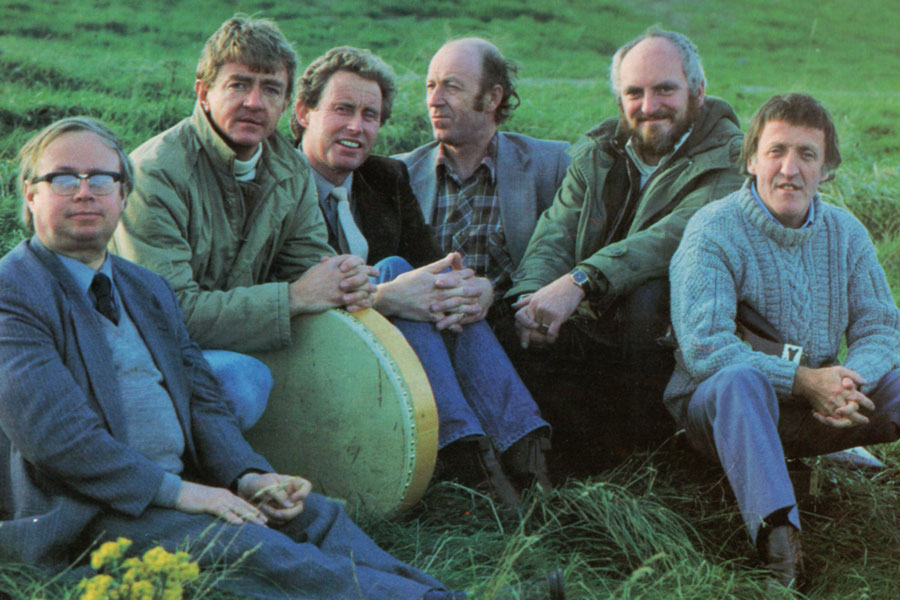
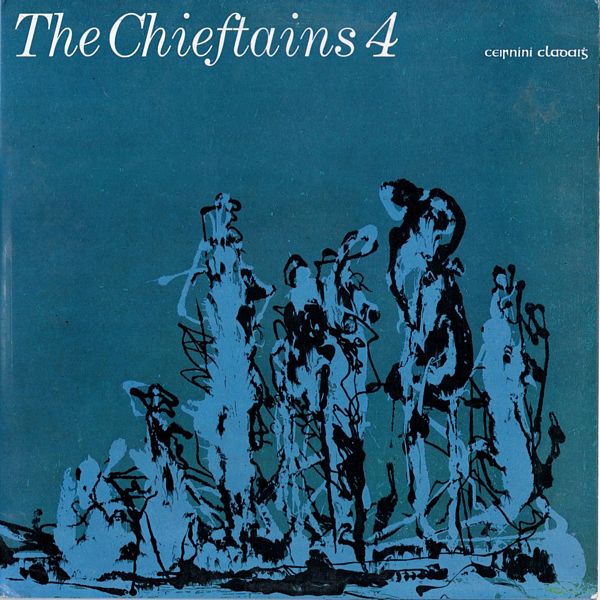 |
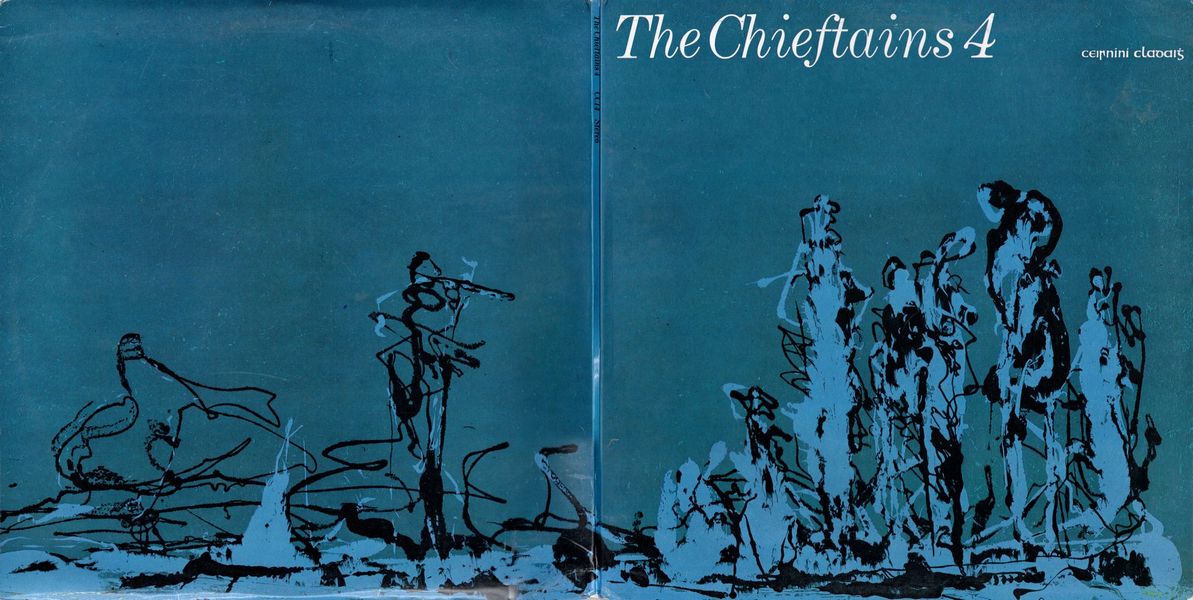
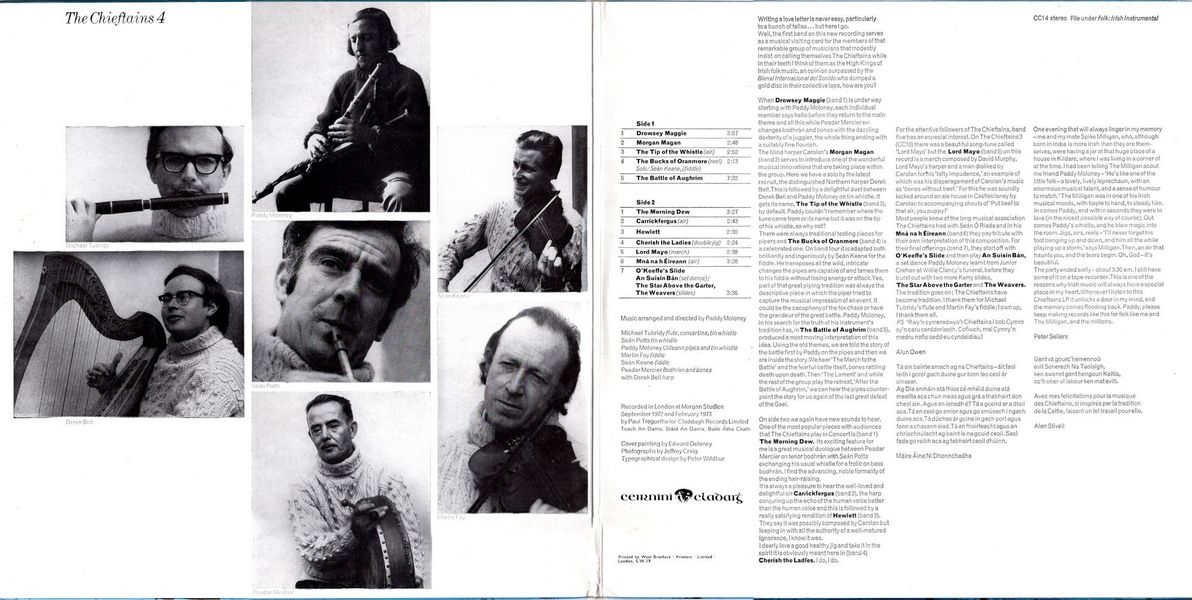 |
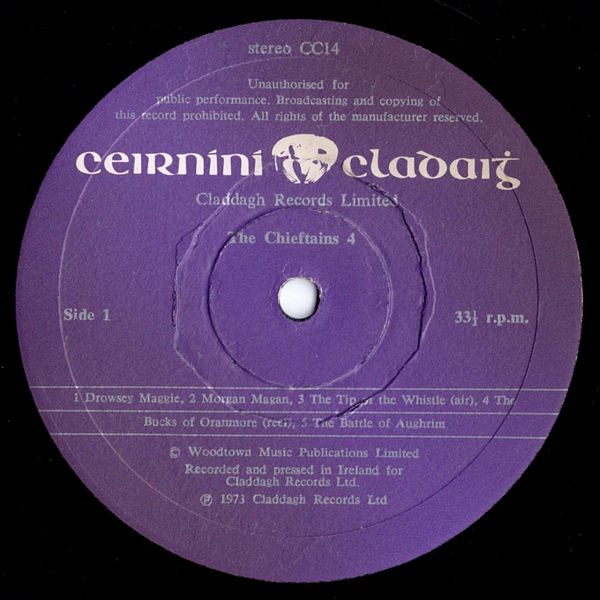
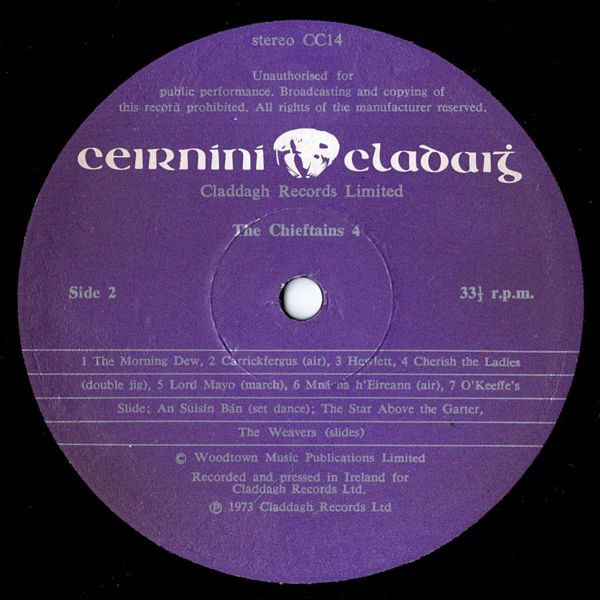 |
Sleeve Notes
Writing a love letter is never easy, particularly to a bunch of fellas... but here I go.
Well, the first band on this new recording serves as a musical visiting card for the members of that remarkable group of musicians that modestly insist on calling themselves The Chieftains while in their teeth I think of them as the High Kings of Irish folk music, an opinion surpassed by the Bienal Internacional del Sonido who dumped a gold disc in their collective laps, how are you?
When Drowsey Maggie (band 1) is underway starting with Paddy Moloney, each individual member says hello before they return to the main theme and all this while Peadar Mercier exchanges bodhrán and bones with the dazzling dexterity of a juggler, the whole thing ending with a suitably fine flourish.
The blind harper Carolan's Morgan Magan (band 2) serves to introduce one of the wonderful musical innovations that are taking place within the group. Here we have a solo by the latest recruit, the distinguished Northern harper Derek Bell. This is followed by a delightful duet between Derek Bell and Paddy Moloney on tin whistle. It gets its name, The Tip of the Whistle (band 3), by default. Paddy couldn't remember where the tune came from or its name but it was on the tip of his whistle, so why not?
There were always traditional testing pieces for pipers and The Bucks of Oranmore (band 4) is a celebrated one. On band four it is adapted both brilliantly and ingeniously by Seá Keane for the fiddle. He transposes all the wild, intricate changes the pipes are capable of and tames them to his fiddle without losing energy or attack. Yes, part of that great piping tradition was always the descriptive piece in which the piper tried to capture the musical impression of an event, it could be the cacophony of the fox chase or have the grandeur of the great battle. Paddy Moloney, in his search for the truth of his instrument's tradition has, in The Battle of Aughrim (band 5), produced a most moving interpretation of this idea. Using the old themes, we are told the story of the battle first by Paddy on the pipes and then we are inside the story. We hear 'The March to the Battle' and the fearful battle itself, bones rattling death upon death. Then 'The Lament' and while the rest of the group play the retreat, 'After the Battle of Aughrim, 'we can hear the pipes counterpoint the story for us again of the last great defeat of the Gael.
On side two we again have new sounds to hear. One of the most popular pieces with audiences that The Chieftains play in Concert is (band 1) The Morning Dew. Its exciting feature for me is a great musical duologue between Peadar Mercier on tenor bodhrán with Seá Potts exchanging his usual whistle for a frolic on bass bodhrán. I find the advancing, noble formality of the ending hair-raising.
It is always a pleasure to hear the well-loved and delightful air Carrickfergus (band 2), the harp conjuring up the echo of the human voice better than the human voice and this is followed by a really satisfying rendition of Hewlett (band 3). They say it was possibly composed by Carolan but leaping in with all the authority of a well-matured ignorance, I know it was.
I dearly love a good healthy jig and take it in the spirit it is obviously meant here in (band 4) Cherish the Ladles. I do, I do.
For the attentive followers of The Chieftains, band five has an especial interest. On The Chieftains 3 (CC10) there was a beautiful song-tune called 'Lord Mayo1 but the Lord Mayo (band 5) on this record is a march composed by David Murphy, Lord Mayo's harper and a man disliked by Carolan for his 'lofty impudence,' an example of which was his disparagement of Carolan's music as 'bones without beef.' For this he was soundly kicked around an ale house in Castleblaney by Carolan to accompanying shouts of 'Put beef to that air, you puppy!'
Most people know of the long musical association The Chieftains had with Seá Ó Riada and in his Mná na h Êireann (band 6) they pay tribute with their own interpretation of this composition. For their final offerings (band 7), they start off with O'Keeffe's Slide and then play An Suisín Bán, a set dance Paddy Moloney learnt from Junior Crehan at Willie Clancy's funeral, before they, burst out with two more Kerry slides, The Star Above the Garter and The Weavers. The tradition goes on; The Chieftains have become tradition. I thank them for Michael Tubridy's flute and Martin Fay's fiddle; I own up, I thank them all.
PS 'Rwy'n cymeradwyo'r Chieftains i bob Cymro sy'n caru cerddoriaeth. Cofiwch, mai Cymry'n medru nofio oedd eu cyndeidiau !
Alun Owen
One evening that will always linger in my memory — me and my mate Spike Milligan, who, although born in India is more Irish than they are themselves, were having a jar at that huge place of a house in Kildare, where I was living in a corner of at the time. I had been telling The Milligan about me friend Paddy Moloney — 'He's like one of the little folk — a lovely, lively leprechaun, with an enormous musical talent, and a sense of humour to match.' The Milligan was in one of his Irish musical moods, with tipple to hand, to steady him. In comes Paddy, and within seconds they were in love (in the nicest possible way of course). Out comes Paddy's whistle, and he blew magic into the room. Jigs, airs, reels — 'I'll never forget his foot banging up and down, and him all the while playing up a storm, 'says Milligan. Then, an air that haunts you, and the tears begin. Oh, God — it's beautiful. The party ended early — about3.30am. I still have some of it on a tape-recorder. This is one of the reasons why Irish music will always have a special place in my heart. Whenever I listen to this Chieftains LP it unlocks a door in my mind, and the memory comes flooding back. Paddy, please keep making records like this for folk like me and The Milligan, and the millions.
Peter Sellers
Gant va gourc'hemennoù evit Sonerezh Na Taoisigh ken awenet gant hengoun Keltia oc'h ober ul labour kent mat eviti.
Avec mes félicitations pour la musique des Chieftains, si inspirés par la tradition de la Celtie, faisant un tel travail pour elle.
Alan Stivell